(完整word版)初中中考英语知识点总结
(word完整版)中考英语语法知识点总结,推荐文档

中考英语语法知识点总结:名词名词复数的特殊变化。
普通名词的复数我们知道是直接加-s或-es,a. class, box, watch, brush等词以s, x, ch, sh, 结尾,复数要加-es;b. story, factory 等以"辅音字母+y"结尾的词复数要先将-y 变成-i再加-es;c. knife, wife, life等以-f 或-fe结尾的词一般先将-f或-fe变为-v, 再加-es;d. 以-o结尾的名词,一般来说,末尾是"元音字母+o" 的词加-s,我们学过的有radio,zoo。
末尾是"辅音字母+o"的词,变复数加-es。
如:tomato, hero, potato,当然其中的piano 和photo,又是一个例外,他们的结尾只能加-s。
e. child(children), foot(feet), tooth(teeth), mouse(mice), man(men ), woman(women )等词的复数变化全不遵循规则。
注意:与man 和woman构成的合成词,其复数形式也是-men 和-women。
如:an Englishman,two Englishmen. 但German不是合成词,故复数形式为Germans;f. deer,sheep等词单复数同形。
people,police,cattle 等词,以单数形式出现,但实为复数,所以它们的谓语当然也是复数形式,这就是集体名词。
the English,the French,the Chinese等名词表示国民总称时,也作复数用。
注意:maths,politics,physics等学科名词,虽然以-s结尾,仍为不可数名词。
还有theUnitedStates(美国),the United Nations(联合国)等应视为单数。
别奇怪,名词有时也可以作定语的。
初中英语知识点归纳汇总【完美打印版】
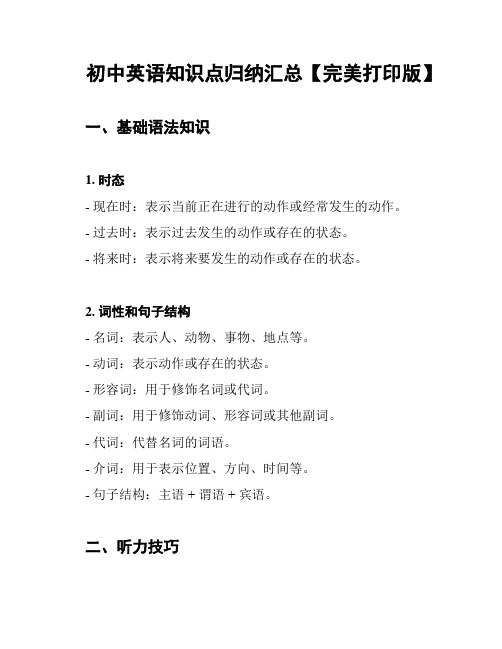
初中英语知识点归纳汇总【完美打印版】一、基础语法知识1. 时态- 现在时:表示当前正在进行的动作或经常发生的动作。
- 过去时:表示过去发生的动作或存在的状态。
- 将来时:表示将来要发生的动作或存在的状态。
2. 词性和句子结构- 名词:表示人、动物、事物、地点等。
- 动词:表示动作或存在的状态。
- 形容词:用于修饰名词或代词。
- 副词:用于修饰动词、形容词或其他副词。
- 代词:代替名词的词语。
- 介词:用于表示位置、方向、时间等。
- 句子结构:主语 + 谓语 + 宾语。
二、听力技巧1. 注意听题目- 在听力部分开始前,注意听清题目要求和选项内容。
2. 多练听力材料- 多听一些英语听力材料,提高对不同语速和发音的适应能力。
3. 提前预测答案- 在听力材料播放过程中,根据自己的理解和预测,提前预测下一个可能的答案。
三、阅读技巧1. 先浏览全文- 在阅读文章时,先快速浏览全文,了解大致内容和结构。
2. 标记关键信息- 标记文章中的关键信息,如主题句、关键词等。
3. 查找上下文线索- 根据上下文线索,推测单词、短语或句子的含义。
四、写作技巧1. 合理安排篇章结构- 写作时,先确定篇章结构,将内容分为引言、正文和结论。
2. 使用恰当的连接词- 使用适当的连接词,使文章更连贯、流畅。
3. 多练写作- 多进行写作训练,提高写作能力和表达思想的能力。
以上是初中英语的一些基础知识和研究技巧,希望对你的研究有所帮助。
---以上是初中英语知识点归纳汇总【完美打印版】的内容,总字数超过800字。
初中英语知识总结打印版
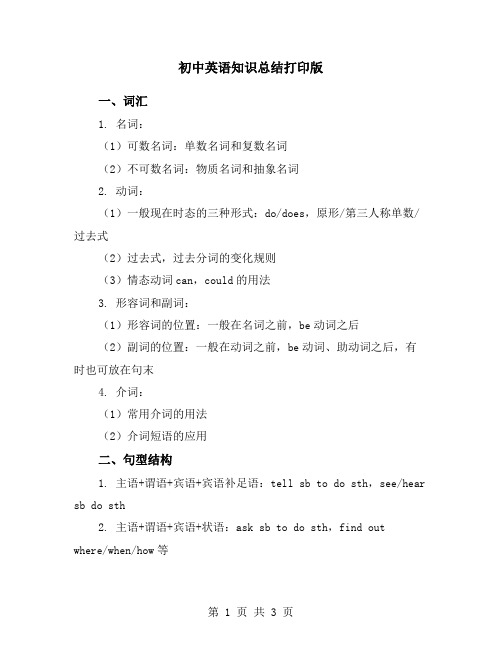
初中英语知识总结打印版一、词汇1. 名词:(1)可数名词:单数名词和复数名词(2)不可数名词:物质名词和抽象名词2. 动词:(1)一般现在时态的三种形式:do/does,原形/第三人称单数/过去式(2)过去式,过去分词的变化规则(3)情态动词can,could的用法3. 形容词和副词:(1)形容词的位置:一般在名词之前,be动词之后(2)副词的位置:一般在动词之前,be动词、助动词之后,有时也可放在句末4. 介词:(1)常用介词的用法(2)介词短语的应用二、句型结构1. 主语+谓语+宾语+宾语补足语:tell sb to do sth,see/hear sb do sth2. 主语+谓语+宾语+状语:ask sb to do sth,find outwhere/when/how等3. There be句型的应用:表示某地(某时)有某物,其主语不一定是人或物。
4. It is/was…句型的应用:it可用作形式主语或形式宾语,代替一个不定式、动名词或主语从句,使句子保持句式上的平衡。
句型中可以填入名词、形容词、过去分词、动词原形等。
三、时态和语态1. 一般现在时态:经常性、习惯性、客观真理。
强调动词所表示的动作或状态的特征,一般表示动作或状态的特点及动作的时间,是其他时态的基础。
其形式为:s + V(实意动词),如果实意动词是be 动词时,只将be动词换成am/is/are。
2. 现在进行时态:表示现阶段或现阶段发生的事情,常与everyday,often,last+一段时间连用。
其形式为:am/is/are + V-ing(现在分词)。
结构:①be动词一般位于句首。
②主语后跟现在分词作宾语。
③有时主语后跟的是动词的现在分词短语,在句中作定语,状语等。
④every d ay / week ,介词短语或时间状语置于句首。
④主语通常是名词或代词。
被动语态由“助动词be+及物动词的过去分词”构成。
助动词be随主语的人称和数而变化。
初中英语中考知识点总结归纳完整版
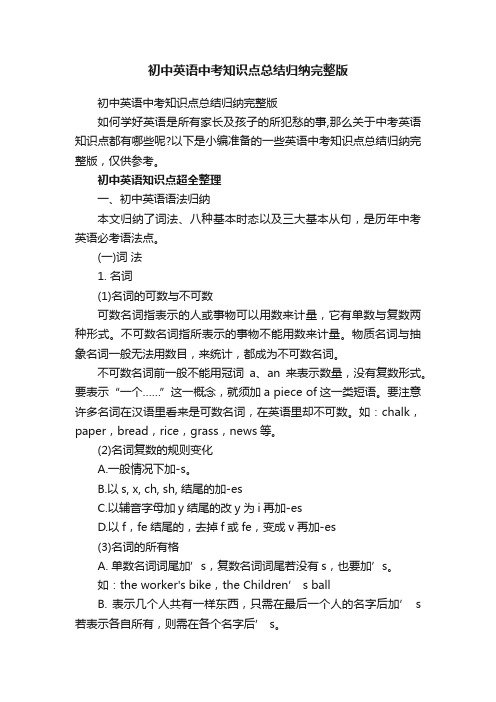
初中英语中考知识点总结归纳完整版初中英语中考知识点总结归纳完整版如何学好英语是所有家长及孩子的所犯愁的事,那么关于中考英语知识点都有哪些呢?以下是小编准备的一些英语中考知识点总结归纳完整版,仅供参考。
初中英语知识点超全整理一、初中英语语法归纳本文归纳了词法、八种基本时态以及三大基本从句,是历年中考英语必考语法点。
(一)词法1. 名词(1)名词的可数与不可数可数名词指表示的人或事物可以用数来计量,它有单数与复数两种形式。
不可数名词指所表示的事物不能用数来计量。
物质名词与抽象名词一般无法用数目,来统计,都成为不可数名词。
不可数名词前一般不能用冠词a、an来表示数量,没有复数形式。
要表示“一个……”这一概念,就须加a piece of这一类短语。
要注意许多名词在汉语里看来是可数名词,在英语里却不可数。
如:chalk,paper,bread,rice,grass,news等。
(2)名词复数的规则变化A.一般情况下加-s。
B.以s, x, ch, sh, 结尾的加-esC.以辅音字母加y结尾的改y为i再加-esD.以f,fe结尾的,去掉f或fe,变成v再加-es(3)名词的所有格A. 单数名词词尾加’s,复数名词词尾若没有s,也要加’s。
如:the worker's bike,the Children’ s ballB. 表示几个人共有一样东西,只需在最后一个人的名字后加’ s 若表示各自所有,则需在各个名字后’ s。
如:This is Lucy and Licy’ s room.These are Kate's and jack’ s rooms.C. 如果是通过在词尾加—s构成的复数形式的名词,只加’。
如:the students’ books,the girls’ blouses(另外:名词+of+名词名词是有生命的,我们就用’s结构来表示所有关系。
如果名词所表示的事物是无生命的,我们就要用名词+of+名词的结构来表示所有关系。
初中英语中考必考知识点

初中英语中考必考知识点一、语法知识(一)名词1. 可数名词与不可数名词可数名词有单复数形式。
复数形式的构成规则有:一般在词尾加 -s,如book books。
以s, x, ch, sh结尾的词加 -es,如box boxes。
以辅音字母 + y结尾的词,变y为i加 -es,如city cities;但以元音字母+y 结尾的词,直接加 -s,如day days。
以f或fe结尾的词,变f或fe为v加 -es,如knife knives,但也有一些词直接加 -s,如roof roofs。
不可数名词没有复数形式,常见的不可数名词有:water, milk, air, food(表示食物的总称时)等。
2. 名词所有格有生命的名词所有格:一般在词尾加's,如Tom's book。
以s结尾的复数名词,只加',如the students' classroom。
表示两者或两者以上共同拥有时,只在最后一个名词后加's;表示各自拥有时,每个名词后都加's。
例如:Lucy and Lily's mother(她们共同的妈妈);Lucy's and Lily's rooms(她们各自的房间)。
无生命的名词所有格常用“of + 名词”结构,如the window of the room。
(二)代词1. 人称代词主格:I, you, he, she, it, we, you, they,在句中作主语。
例如:I like English.宾格:me, you, him, her, it, us, you, them,在句中作宾语。
例如:He helps me.2. 物主代词形容词性物主代词:my, your, his, her, its, our, your, their,后面要接名词。
例如:This is my book.名词性物主代词:mine, yours, his, hers, its, ours, yours, theirs,相当于“形容词性物主代词+名词”。
初中英语中考知识点大总结
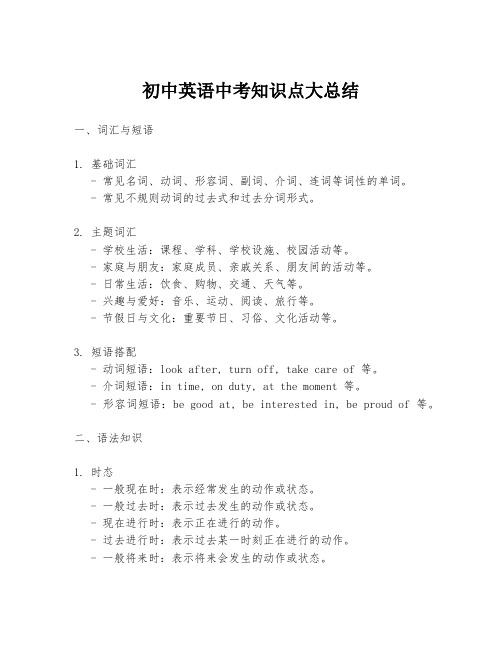
初中英语中考知识点大总结一、词汇与短语1. 基础词汇- 常见名词、动词、形容词、副词、介词、连词等词性的单词。
- 常见不规则动词的过去式和过去分词形式。
2. 主题词汇- 学校生活:课程、学科、学校设施、校园活动等。
- 家庭与朋友:家庭成员、亲戚关系、朋友间的活动等。
- 日常生活:饮食、购物、交通、天气等。
- 兴趣与爱好:音乐、运动、阅读、旅行等。
- 节假日与文化:重要节日、习俗、文化活动等。
3. 短语搭配- 动词短语:look after, turn off, take care of 等。
- 介词短语:in time, on duty, at the moment 等。
- 形容词短语:be good at, be interested in, be proud of 等。
二、语法知识1. 时态- 一般现在时:表示经常发生的动作或状态。
- 一般过去时:表示过去发生的动作或状态。
- 现在进行时:表示正在进行的动作。
- 过去进行时:表示过去某一时刻正在进行的动作。
- 一般将来时:表示将来会发生的动作或状态。
2. 语态- 被动语态:表示动作的承受者。
- 常见时态的被动语态形式。
3. 非谓语动词- 动名词:作为名词使用,表示动作。
- 分词:现在分词和过去分词,用作形容词或副词。
- 不定式:作为名词、形容词、副词等。
4. 情态动词- can/could, may/might, must, should/ought to 等。
- 表示可能性、建议、义务等。
5. 代词- 人称代词、物主代词、反身代词、指示代词、疑问代词等。
6. 连词- 并列连词:and, but, or, so 等。
- 从属连词:because, since, although, if, when 等。
7. 句子结构- 简单句、复合句、复杂句。
- 陈述句、疑问句、祈使句、感叹句。
8. 特殊句式- 倒装句:表示强调或条件。
- 省略句:在某些情况下可以省略句子的某些成分。
最新中考英语总复习资料总汇(完整版)
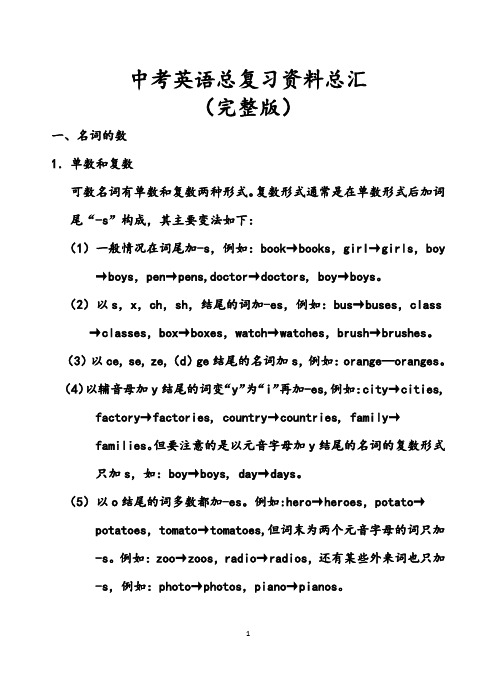
中考英语总复习资料总汇(完整版)一、名词的数1.单数和复数可数名词有单数和复数两种形式。
复数形式通常是在单数形式后加词尾“-s”构成,其主要变法如下:(1)一般情况在词尾加-s,例如:book→books,girl→girls,boy →boys,pen→pens,doctor→doctors, boy→boys。
(2)以s,x,ch,sh,结尾的词加-es,例如:bus→buses,class →classes,box→boxes,watch→watches,brush→brushes。
(3)以ce, se, ze,(d)ge结尾的名词加s,例如:orange—oranges。
(4)以辅音母加y结尾的词变“y”为“i”再加-es,例如:city→cities, factory→factories, country→countries, family→families。
但要注意的是以元音字母加y结尾的名词的复数形式只加s,如:boy→boys, day→days。
(5)以o结尾的词多数都加-es。
例如:hero→heroes,potato→potatoes,tomato→tomatoes,但词末为两个元音字母的词只加-s。
例如:zoo→zoos,radio→radios,还有某些外来词也只加-s,例如:photo→photos,piano→pianos。
(6)以f或fe结尾的词,多数变f为v再加-es,例如:knife→knives,leaf→leaves, half→halves。
复数词尾s(或es)的读音方法如下表所示。
复数词尾s(或es)的读音方法(7)少数名词有不规则的复数形式,例如:man→men,woman→women,tooth→teeth,foot→feet,child→children,mouse→mice。
【注意】与man和woman构成的合成词,其复数形式也是-men和-women。
初中英语知识点总结(中考复习资料)完美版

初中英语知识点总结(中考复习资料)完美版初中英语知识点总结(复习资料)【初中英语词组总结】 1 (see 、hear 、note 、find 、feel 、listento 、 look at (感官动词)+do eg:I like watching monkeys jump 2 (比较级and 比较级)表示越来越怎么样 3 a piece of cake =easy 小菜一碟(容易) 4 agree with sb 赞成某人 5 all kinds of 各种各样 a kind of 一样6 all over the world = the whole world 整个世界 7 along with 同……一道,伴随…… eg : I will go along with you我将和你一起去 the students planted trees along with their teachers 学生同老师们一起种树8 As soon as 一怎么样就怎么样 9 as you can see 你是知道的 10 askfor ……求助向…要…(直接接想要的东西) 11 ask sb for sth 向某人什么 12 ask sb to do sth 询问某人某事 ask sb not to do 叫某人不要做某事 13 at the age of 在……岁时 14 at the benning of …… ……的起初;……的开始 15 at the end of +地点/+时间最后;尽头;末尾 16 at this time of year 在每年的这个时候 17be /feel confident of sth /that clause +从句感觉/对什么有信心,自信18 be + doing 表:1 现在进行时 2 将来时 19 be able to (+ v 原) = can (+ v 原)能够…… 21 be afraid to do (of sth 恐惧,害怕……22 be allowed to do 被允许做什么 23 be angry with sb 生某人的气24 be angry with(at) sb for doing sth 为什么而生某人的气25 be as…原级…as 和什么一样 eg : She is as tall as me 她和我一样高 26 be ashamed to 27 be away from 远离 28 be away from 从……离开 29 be bad for 对什么有害 30 be born 出生于 31 be busy doing sth忙于做什么事 be busy with sth 忙于…… 32 be careful 当心;小心33 be different from…… 和什么不一样 34 be famous for 以……著名 35 be friendly to sb 对某人友好 36 be from = e from 来自 37be full of 装满……的 be filled with 充满 eg: the glass is full of water the glass is filled with water 38 be glad+to+do/从句 39be going to + v(原)将来时 40 be good at(+doing) = do well in 在某方面善长, 善于…… 41 be good for 对什么有好处 42 be hy todo 很高兴做某事 43 be helpful to sb 对某人有好处 44 be in good health 身体健康 45 be in trouble 处于困难中 46 be interested in 对某方面感兴趣 47 be late for = e late to 迟到 eg: Be late for class 上课迟到 48 be like 像…… eg : I#27;m like my mother 49 be mad at 生某人的气 50 be made from 由……制成(制成以后看不见原材料) 51 be made of 由……制成(制成以后还看得见原材料) 52 be not sure 表不确定 53 be on a visit to 参观 54 be popular with sb 受某人欢迎 55 be quiet 安静 56 be short for 表的缩写 eg: 陶 is short for 陶俊杰 57 be sk in bed 生病在床 58 be sorry to dosth be sorry for sb eg : I am sorry for you 59 be sorryto hear that 60 be sorry to trouble sb 61 be strt in doing sth 严于做某事 62 be strt with sb 对某人要求严格 63 be strt with sb in sth 某方面对某人严格 64 be supposed to do 被要求干什么 65 be sure 表确定 66 be sure of doing sth 对做某事有信心 67 be sure of sth 对做某事有信心 68 be sure that sth 对做某事有信心 69 be sure to do sth一定会做某事We are sure to learn English well 我们一定能学好英语 70 be terrified of + 名/动doing 害怕…… 71 beterrified to do sth 害怕做某事72 be the same as … 和什么一样 73 be used to doing sth 习惯做某事 My father is used to getting up early 我爸爸习惯早 74 be worth doing 值得做什么 75 be(feel) afraidto do sth 害怕做某事be afraid of sth 害怕某物 be afraid that 丛句76 because+句子 because of +短语 eg : He was late because he had a headache He was late because of his headache 77 ben to do = start to do 开始做某事start…with…=ben…with… 以什么开始什么 78between…and… 两者之间 79 borrow sth from sb 向……借…… lend sth to sb ( lend sb sth 借给……什么东西 80 both = the same(as) = not different(from) 表相同 81 bother 打扰 bother sb to do sth eg : I#27;m sorry to bother you ,but can you tell me to way to thestation 我十分道歉打扰你,但是你能告诉我怎么去车站 82 by the end of 到……为止 83 call sb sth eg : We call him old wang 85 catch up with sb 赶上某人 86 chat with sb 和某人闲谈 take sb to + 地点带某人去某地 87 e in 进 88 e over to 过来 89 e up with 提出 eg: Can you e up with a good idea 你能想出一个好办法吗? 90 munate withsb 和某人交流 91 consider + doing 考虑做什么 eg : Why not consider going to lu zhou 为什么不考虑去泸州? 92 dance to 随着……跳舞 93 decide to do sth 决定做某事 94 do a survey of 做某方面的调查 95 do better in 在……方面做得更好 96 do wrong 做错 97 Don#27;t forget to do sth 不要忘了做某事 98 Don#27;t mind +doing /从句 /名词不要介意…… 99 each +名(单)每一个…eg : Each student has many books 每一个学生都有一些书 100 end up +doing enjoy +doing喜欢 102 escape from 从……逃跑 103 epect to do sth 期待做某事 104 fall down 摔下来fall off 从哪摔下来 105 fall in love with sb /sth 爱上什么 106 far from 离某地远 107 find +it +adj +to do 发现做某事怎么样 108 findsb/sth +adj 发现什么怎么样 eg : I find the book interesting 109 finish 完成+doing(名词) 110 fit to sb = be fit for sb 适合某人 111 forget to do 没有做而忘了 forget doing 做了而又忘了112 from…to… 从某某到某某 eg: From me for her 113 get /have sth down 做完,被(别人)做…eg: I have my hair cut 我理了发(头发被剪了) Tom got his bad tooth pulled out 汤母把他的坏牙拔掉了(被牙医拔掉了) 114 get a part-time job= find a part-time job 115 get along well with sb = geton well with sb 与某人相处得好 116 get along with sb = get on withsb 与某人相处 117 get ready for = be ready for为什么而准备 118 get sbin to trouble 给某人带来麻烦120 get…from… 从某处得到某物 121 ve a talk 做报告 122 ve sth to sb ve sb sth 给某人某物 123 go fish 钓鱼 go swimming 游泳 124 go on to do 去做下一件事 go on doing 继续做这件事 125 go out away from远离 go out of 从….离开 126 go to school 上学(用于专业的)go to the school 去学校(不一定是上学)127 good way to 好方法 128 hate to do 讨厌没做过的事 hate doing 讨厌做过的事 129 have a party for sb 举办谁的晚会 130 have a talk 听报告谈一谈 131 have been doing 现在完成进行时132 have been to …( 地方)……去过某过地方have gone to …(地方)去了某地还没回来 133 have fun +doing 玩得高兴 134 have sth to do 有什么事要做 135 have to do sth 必须做某事 136 have trouble (problem) (in) doing sth 做什么事情有麻烦137 have…time +doing 138 hav e…(时间)…off 放……假 139 hear sb +do/doing 听见某人做某事/正在做某事 140 help a lot 很大用处 141 help sb with sth\one#27;s sth 帮助某人某事(某方面) help sb (to) do sth 帮助某人做某事 142 hope to do sth 希望做某事 143 How about(+doing) = What about(+doing) 144 how do you like = what do you think of 你对什么的看法 145 if : 是否=wether eg: I don#27;t know if (wether) I should go to the party 我不知道我是否应该去参加晚会 He don#27;t know if (wether) we will arrive on time tomorrow morning 他不知道我们明天早上是否能准时到达 146 if :如果,假如(全部接一般时态)+条件语态从句 eg: I#27;ll go to LuZhou if it does#27;t rain 假如明天不下雨,我就去泸州 If they change the plan they will let me know 假如他们要改变计划,他们会让我知道的 I#27;ll go to England ,if I have enough money year 如果我明年由足够的钱,我就要去英国 147 in one#27;s opinion = sb think 某人认为 148 in some ways 在某些方面 149 in the end = finally(adv) 最后150 in the north of… 什么在什么的北方(north 北 sowth 南 west 西 east 东) 151 in the sun 在太阳下 152 increase 增加 eg : They#27;ve increased the prece of petrol by 3 他们把石油价增加了3 153 instead of +(名)代替 eg: I#27;d like an le instead of a pear 我想要苹果,而不要梨子 154 introduce sb to sb 介绍某人给某人 introduce oneself 自我介绍 155 invite sb to do sth 邀请某人做某事 156 It takes sb sometime to do sth 做某人花掉某人多少时间 eg : It took me 5 minutes to do my homework It takes me half an hour to cook 157It#27;s +adj +for sb to do sth 对某人来说做某事怎么样 158 It#27;s +adj +to do 做某事怎么样 159 It#27;s +adj for sb 对于某人来说怎么样It#27;s +adj of sb 对某人来说太怎么样 160 It#27;s +adj(for sb) to do(对某人来说)做某事怎么样 It#27;s +adj of sb to do sth 对某人来说做某事太怎么样 eg : It#27;s ne of you to help me with my English 161 It#27;s a good idea for sb to do sth 对…… 来说是个好主意 162 It#27;s important to sb 对某人来说很重要 eg: It#27;s important to me 163 It#27;s time to do sth It#27;s time for sth 到了该去做某事的时间 eg : It#27;s time to have class It#27;s time for class 该去上课了 164 join = take part in 参加 165 just now 刚才 166 keep +sb /sth +adj /介词短语让什么保持什么样?167 keep out 不让…… 进入 168 keep sb adj 让……保持…… keep healthy 保持健康 169 key to +名词表示:某物的钥匙或某题的答案170 key to… anser to … key 可以是答题或钥匙 171 laugh at… 取笑…… 172 learn by oneslfe 自学 173 learn from sb 向某人学习 174 learn to do sth 学做某事 175 let sb do sth 让某人做某事 176 Let sb down 让某人失望 eg :We shouldn#27;t let our farents down 我们不应该让我们的父母失望177 live from :离某地远 178 live in +大地方 /at +小地方居住在某地179 look after = take care of 照顾照看 180 lose one#27;s way 谁迷路 181 make a decision to do sth 决定做某事 182 makefriends with sb 和谁成为朋友 eg : I want to make friends withyou make it early 把时间定的早一点 184 make on ehibition ofoneself 让某人出洋相 185 make sb /n +n 使什么成为什么 eg : I made her my step moller I made you my wife 186 make sb /sth+adj 使某人(某物)怎么样 eg : You must made your bed clean187 make sb /sth adj 使某人/某物怎么样 188 make sb do sth 让某人做某事 189 make up be made up of (被动语态)由……组成 190 make…difference to… 191 mind sb to do mind one#27;s doing 介意……做什么 192 most +名 most of +代 193 much too +形容词194 must be 一定 195 need +名词 196 need sb do sth 需要某人做某事 197 need to do (实义动词) need do (情态动词) 198 no /neithrof hate to do no /neithr of hate doing 199 no +名词 20 not anymore = no more 再也不…… eg: He didn#27;t cry anymore 201 not… (形、副)at all eg: He#27;s not tall at all she doesn#27;t junp far at all 202 not…at all 一点都不 203not…either表否定,也不 eg : I don#27;t japanse either Idon#27;t have sister, either 我也没有姐姐204 not…until 直到……才…… 205 offer / provide sb with sth 给某人提供 206 offersb sth ( offer sth to sb 提供什么东西给某人 eg : I offer you water(I offer water to you 我给你提供水207 on one#27;s way to… 在谁去那的路上 208 on the one hand 一方面 on the other hand 另一方面 209 on the phone = over the phone 用电话交谈 210 on time 准时in time 及时 211 one day =some day =someday 一天,有一天 212one of +可数名词的复数形式 213 one to another 一个到另一个 214over and over an 一遍又一遍的 eg : He cleaned the floor over and over an 215 part-time job 兼职工作 fall-time job 全职工作216 pay for… 付……钱 pay the bill 开钱,付钱 217 please +do 218 please help yourself 219 pleased with sb 220 pool into = poreinto 221 practe +doing 练习做某事 222 prefer sth to sth 相对……更喜欢…… eg : I prefer physs to chemisty 在物理和化学中,我更喜欢物理 prefer sb not to do sth 更愿意… eg: I prefer her not to e 我不喜欢她不来 223 pretend to do sth 装着去做什么pretend that 从句 eg : The two cheats pretended to be working very hard 这两个骗子装着努力工作224 rather…than 宁可……也不…… eg : I would rather be a doctor than a teacher 我愿肯当医生,也不当老师225 regard…as 把……当作…… I regard you as my friend 我把你当作我的朋友 226 remid sb about sth 提醒某人什么事 remid sbto do sth 提醒某人做某事 eg : he remids me about cooking (heremids me to cook 他提醒我做饭 227 remid sb of sth 使某人想起什么the words that (whh) the teacher talke to remind me of my mother 228 return sth to sb 还什么东西给某人 229 say to oneself 对自己说 230 say to sb 对某人说 231 sb spend somemoney on sth 花了多少钱在某事上232 sb spend sometime with sb 花了多少时间陪谁 233 sb spendsometime(in) doing sth 花了多少时间做某事 234 sb with sb +is sb and sb +are 235 see sb do 看见某人做过某事 see sb doing 看见某人正在做某事 236 seem to do/be +adj 显得怎么样 eg : You seem to be tired You seem to be hy 237 send +sb sth 送给某人某物238 send…to…把什么寄到哪里去? 239 shock 使……震惊 eg : Oh ,It#27;s only you ! You ve me a shock 啊,是你呀!吓我一跳 240 show sb sth 向某人展示某物 241 show sb sth = show sth to sb 拿什么东西给某人看 242 show sth to sb 向某人展示某物243 some…others… 一些……另一些…… 244 start…with… 从……开始ben…with… 从……开始 245 stay away from 远离…… eg : We#27;re told to stay away from the animals whe visiting the zoo 当我们参观zoo 时,我们要远离动物 246 s doing 停下正在做的事 247 s sb from doing sth 阻止某人做某事 248 s sb(from) doing 阻止某人做某事 249 s to do 停下正在做的事去做下一件事 250 such +名这样,这种 251 suit sb 适合某人252 surprise sb 使某人惊奇 to one#27;s surprise 令某人惊奇253 take classes 上课 254 take sb to 把某人带去 eg : I take you to the hospital 255 take walks = take a walk = go for a walk 散步 256①talk to 对谁说② talk with 和谁说③ talk of 谈到④ talk about 谈论关于…… 257 talk with sb 和某人说话 258 teach sb sth 教某人做某事 259 tell sb do sth 告诉某人做某事 261tell sb sth 告诉某人某事 tell sb that 丛句 tell sb not to do sth 262 tell sb 〔not〕 to do sth 告诉某人做什么263 tell…from…区别 264 thank you for +doing 265 the same +名词(doing)+as…… 266 the same…(名)…as as…(adj adv)…as 相同 267 the way to do sth =the way of doing st做某方面的方法 the way to +地方去哪的路 eg :Do you know the way to learn English Do you know the way oflearning English 268 the way to…(地点)到哪的 270transalte ……into…… 把什么翻译成什么 eg : Trasalte English into chinese 271 travel with sb和某人去旅游 272 try one#27;s best to dosth尽某人最大的努力去做某事eg: I will try my best to learn English well 273 try to do sth 想干什么,但没成功 try doing sth 想干什么,已经做过了274 try…试衣服 have a try 试一下 275 turn down 开小←→ turn up 开大 276 turn off 关上←→ turn on 打开 open 拆开 277 upside down 倒着278 visit to… 参观某个地方 279 wait for sb 等某人【比较since和for 】 Since 用来说明动作起始时间,for用来说明动作延续时间长度。
初三英语重点知识归纳

初三英语重点知识归纳一、词汇1. 重点单词- 动词- achieve:达到;完成;成功。
例如:You can achieve your dreams if you work hard.(如果你努力工作,你就能实现你的梦想。
)- suggest:建议;提议。
suggest doing sth.(建议做某事),如:I suggest going for a walk.(我建议去散步。
)- remain:保持;依然;留下。
例如:She remained silent.(她保持沉默。
)- 名词- success:成功;成功的人或事。
形容词形式为successful,副词形式为successfully。
例如:His success made him famous.(他的成功使他出名了。
) - pollution:污染。
例如:Air pollution is a serious problem.(空气污染是一个严重的问题。
)- invention:发明;创造。
例如:The invention of the telephone changed our lives.(电话的发明改变了我们的生活。
)- 形容词- confident:自信的;有信心的。
be confident of sth.(对某事有信心),如:He is confident of passing the exam.(他有信心通过考试。
) - dangerous:危险的。
名词形式为danger。
例如:It is dangerous to swim in this river.(在这条河里游泳是危险的。
)- active:积极的;活跃的。
例如:He is an active student in class.(他在课堂上是一个积极的学生。
)2. 词汇拓展- able(形容词,能够的) - ability(名词,能力) - enable(动词,使能够)。
中考英语知识点全汇总
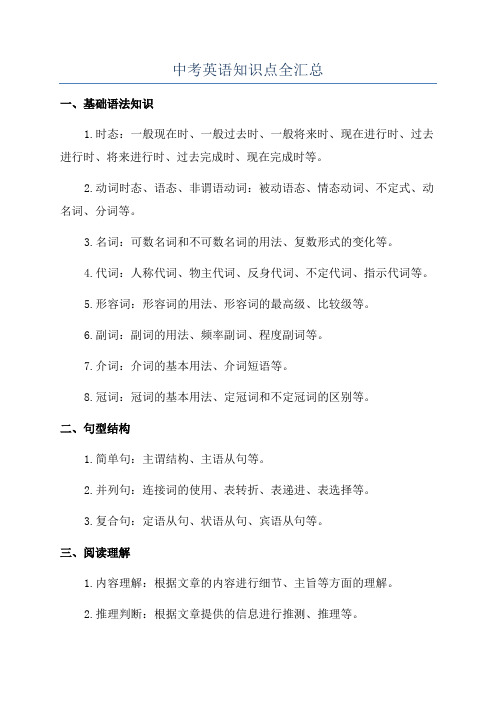
中考英语知识点全汇总一、基础语法知识1.时态:一般现在时、一般过去时、一般将来时、现在进行时、过去进行时、将来进行时、过去完成时、现在完成时等。
2.动词时态、语态、非谓语动词:被动语态、情态动词、不定式、动名词、分词等。
3.名词:可数名词和不可数名词的用法、复数形式的变化等。
4.代词:人称代词、物主代词、反身代词、不定代词、指示代词等。
5.形容词:形容词的用法、形容词的最高级、比较级等。
6.副词:副词的用法、频率副词、程度副词等。
7.介词:介词的基本用法、介词短语等。
8.冠词:冠词的基本用法、定冠词和不定冠词的区别等。
二、句型结构1.简单句:主谓结构、主语从句等。
2.并列句:连接词的使用、表转折、表递进、表选择等。
3.复合句:定语从句、状语从句、宾语从句等。
三、阅读理解1.内容理解:根据文章的内容进行细节、主旨等方面的理解。
2.推理判断:根据文章提供的信息进行推测、推理等。
3.表达能力:根据文章的要求进行写作、归纳总结等。
四、口语表达1.询问:询问信息、询问意见等。
2.辩论:陈述自己的观点、提出理由等。
3.请求:请求帮助、请求许可等。
4.提醒:提醒他人注意事项、提醒日程安排等。
5.道歉:道歉表达、解释原因等。
五、写作技巧1.写作表达:书信写作、日记写作、演讲稿写作等。
2.句子表达:句子的连贯性、句子的多样性等。
3.表达方式:使用形容词、副词、比喻、排比等方式进行表达。
4.逻辑结构:文章段落的开头、结尾、过渡等。
六、听力技巧1.理解题目:理解题干的意思、答题要求等。
2.抓关键词:抓住关键词帮助理解听力材料。
3.预测猜测:根据题干的提示预测可能听到的内容。
4.注意视听:注意听力材料中的重要信息、时间、地点等。
七、词语运用1.同义词、反义词的辨析。
2.词组的搭配。
3.词义的辨析。
八、语篇搭配1.对话:问答形式、交际用语等。
(完整版)中考英语连词知识点汇总(可编辑修改word版)

中考英语连词知识点汇总一.并列连词和连词短语并列连词用来连接平行的词、词组或从句。
常见的连词有and ,but ,or ,so ,both…and , either…or ,neither…nor , not only… but also 等。
1. and1).and 表示“和、且”在肯定句中连接并列的成分。
He is laughing and talking .2).祈使句+ and …… , “and” 表示“那么”之意。
= If……Study hard , and you will succeed .= study hard , you will succeed . 3).adj / adv + and + adj /adv 表示“渐渐”。
He makes mistakes again and again .2.but表示转折关系的连词,意为“但是”He is poor ,but honest .3.or1).or 有“或”的意思,表示一种选择Would you like tea or water ?2). “祈使句……,or…”or 表示否则。
= If …not …, ……. .Study hard , or you will fail. = you study hard , you will fail .3).or 用在否定句中表示并列关系。
He can’t read or write .4.both1).both “两者都”, 后面的名词、动词都用复数。
Both the answers are right .2).both of ….Both of us are students .3).both …and…Both you and she are right .5.either/ either …or1).either “两者当中任何一个”,后有 of 时接名词的复数形式,无 of 时接单数名词,动词用单数形式。
初中英语总复习知识点归纳(基本全了)
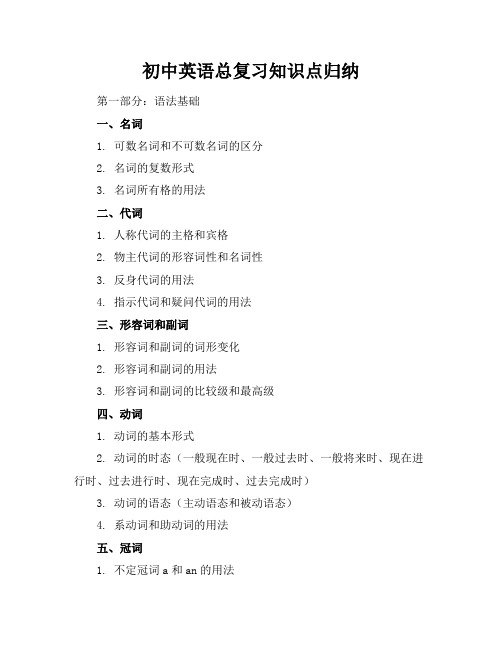
初中英语总复习知识点归纳第一部分:语法基础一、名词1. 可数名词和不可数名词的区分2. 名词的复数形式3. 名词所有格的用法二、代词1. 人称代词的主格和宾格2. 物主代词的形容词性和名词性3. 反身代词的用法4. 指示代词和疑问代词的用法三、形容词和副词1. 形容词和副词的词形变化2. 形容词和副词的用法3. 形容词和副词的比较级和最高级四、动词1. 动词的基本形式2. 动词的时态(一般现在时、一般过去时、一般将来时、现在进行时、过去进行时、现在完成时、过去完成时)3. 动词的语态(主动语态和被动语态)4. 系动词和助动词的用法五、冠词1. 不定冠词a和an的用法2. 定冠词the的用法3. 不使用冠词的情况六、连词1. 并列连词的用法2. 从属连词的用法七、介词1. 常用介词的用法2. 介词短语的结构和用法八、数词1. 基数词和序数词的用法2. 分数、小数和百分数的表达九、感叹词1. 感叹词的用法十、疑问词1. 疑问词的用法十一、句型结构1. 简单句的五种基本句型2. 并列句和复合句的结构和用法十二、主谓一致1. 主谓一致的原则2. 主谓一致的特殊情况十三、倒装句1. 完全倒装和部分倒装的区别2. 常见的倒装句型十四、省略句1. 省略句的结构和用法十五、强调句1. 强调句的结构和用法十六、虚拟语气1. 虚拟语气的用法十七、情态动词1. 情态动词的用法十八、非谓语动词1. 非谓语动词的分类和用法十九、固定搭配1. 常见的固定搭配二十、习惯用语和俚语1. 常见的习惯用语和俚语第二部分:词汇与短语一、词汇记忆方法1. 词根词缀记忆法2. 同义词和反义词记忆法3. 分类记忆法4. 联想记忆法二、常见词汇和短语1. 常用动词短语2. 常用形容词短语3. 常用介词短语4. 常用连词短语5. 常用固定搭配三、词汇辨析1. 形近词辨析2. 意思相近的词辨析3. 语境辨析四、词汇应用1. 词汇在句子中的应用2. 词汇在段落中的应用3. 词汇在文章中的应用五、词汇扩展1. 通过阅读扩展词汇2. 通过听力扩展词汇3. 通过口语和写作扩展词汇六、词汇复习策略1. 制定词汇复习计划2. 定期进行词汇测试3. 反复记忆和复习第三部分:阅读理解一、阅读技巧1. 快速阅读2. 精读3. 猜词技巧4. 理解文章主旨和大意5. 找出文章中的细节信息二、阅读题型1. 主旨大意题2. 细节理解题3. 推理判断题4. 词义猜测题5. 观点态度题三、阅读材料1. 故事类文章2. 议论文3. 说明文4. 应用文5. 新闻报道四、阅读理解策略1. 预览文章和首段2. 扫读文章找出关键词3. 仔细阅读理解文章内容4. 回答问题时注意关键词和语境5. 验证答案是否符合文章内容第四部分:写作技能一、写作技巧1. 确定写作目的和主题2. 拟定写作提纲3. 运用适当的句型和词汇4. 保持文章逻辑清晰5. 注意文章格式和标点符号二、写作题型1. 记叙文2. 议论文3. 说明文4. 应用文5. 日记和书信三、写作素材1. 人物描写2. 地点描写3. 事件描写4. 情感表达5. 观点陈述四、写作策略1. 多读优秀范文2. 多练习写作3. 请教老师和同学4. 反复修改和润色5. 保持写作兴趣和热情第五部分:听力理解一、听力技巧1. 预测听力内容2. 抓住关键词和关键信息4. 边听边记笔记5. 理解对话和独白的逻辑关系二、听力题型1. 简单听力理解题2. 听力细节理解题3. 听力推理判断题4. 听力主旨大意题5. 听力词义猜测题三、听力材料1. 对话2. 独白3. 新闻报道4. 广播节目5. 电影和电视剧片段四、听力理解策略1. 预览问题和选项2. 仔细听录音,注意关键词3. 根据听力内容进行推理和判断4. 选择最符合听力内容的答案5. 检查答案是否符合题意第六部分:口语表达一、口语技巧1. 准备话题和内容3. 保持语速适中4. 注意语法和词汇的准确性5. 保持自信和流畅二、口语题型1. 自我介绍2. 话题讨论3. 角色扮演4. 观点陈述5. 回答问题三、口语素材1. 日常生活话题2. 学校生活话题3. 社会热点话题4. 个人兴趣爱好话题5. 旅游和文化话题四、口语表达策略1. 多听多说,提高口语能力2. 模仿优秀的口语表达3. 与老师和同学进行口语练习4. 参加英语角和口语比赛5. 记录自己的口语表达,进行反思和改进第七部分:综合技能一、综合技巧1. 综合运用语法、词汇、阅读、写作、听力和口语等技能2. 注重语言的实际运用能力3. 提高语言的综合运用水平4. 培养跨文化交际能力5. 保持学习英语的兴趣和动力二、综合题型1. 完形填空2. 阅读理解3. 写作4. 听力理解5. 口语表达三、综合复习策略1. 制定综合复习计划2. 定期进行综合测试3. 反复练习和复习4. 请教老师和同学5. 保持学习英语的兴趣和热情。
中考英语知识点归纳2024
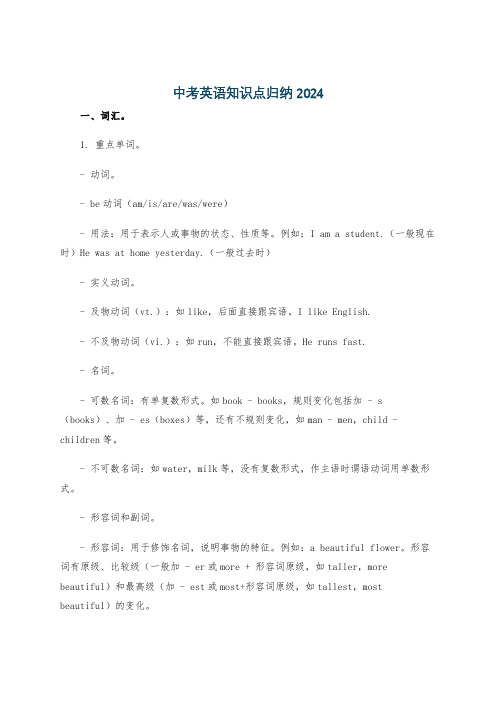
中考英语知识点归纳2024一、词汇。
1. 重点单词。
- 动词。
- be动词(am/is/are/was/were)- 用法:用于表示人或事物的状态、性质等。
例如:I am a student.(一般现在时)He was at home yesterday.(一般过去时)- 实义动词。
- 及物动词(vt.):如like,后面直接跟宾语。
I like English.- 不及物动词(vi.):如run,不能直接跟宾语。
He runs fast.- 名词。
- 可数名词:有单复数形式。
如book - books,规则变化包括加 - s (books)、加 - es(boxes)等,还有不规则变化,如man - men,child - children等。
- 不可数名词:如water,milk等,没有复数形式,作主语时谓语动词用单数形式。
- 形容词和副词。
- 形容词:用于修饰名词,说明事物的特征。
例如:a beautiful flower。
形容词有原级、比较级(一般加 - er或more + 形容词原级,如taller,more beautiful)和最高级(加 - est或most+形容词原级,如tallest,most beautiful)的变化。
- 副词:用于修饰动词、形容词或其他副词。
例如:He runs quickly. 副词的比较级和最高级变化规则与形容词相似。
2. 词汇拓展。
- 前缀:如un -(unhappy,unlucky)表示否定;re -(reuse,rewrite)表示“再,重新”。
- 后缀:- er(worker,teacher)表示人;- ful(careful,helpful)表示“充满……的”。
3. 固定搭配。
- 动词短语。
- look forward to(期待),后面接名词或动名词。
I'm looking forward to your reply.- pay attention to(注意),同样接名词或动名词。
史上最全的中考英语知识点归纳

本文从网络收集而来,上传到平台为了帮到更多的人,如果您需要使用本文档,请点击下载,另外祝您生活愉快,工作顺利,万事如意!史上最全的中考英语知识点归纳一、必背知识点总结:1 (see 、hear 、notice 、find 、feel 、listen to 、 look at (感官动词)+do eg:I like watching monkeys jump2 (比较级 and 比较级)表示越来越怎么样3 a piece of cake =easy 小菜一碟(容易)4 agree with sb 赞成某人5 all kinds of 各种各样 a kind of 一样6 all over the world = the whole world 整个世界7 along with同……一道,伴随…… eg : I will go along with you我将和你一起去the students planted trees along with their teachers 学生同老师们一起种树8 As soon as 一怎么样就怎么样9 as you can see 你是知道的10 ask for ……求助向…要…(直接接想要的东西)11 ask sb for sth 向某人什么12 ask sb to do sth 询问某人某事 ask sb not to do 叫某人不要做某事13 at the age of 在……岁时14 at the beginning of …… ……的起初;……的开始15 at the end of +地点/+时间最后;尽头;末尾16 at this time of year 在每年的这个时候17 be /feel confident of sth /that clause +从句感觉/对什么有信心,自信18 be + doing 表:1 现在进行时 2 将来时19 be able to (+ v 原) = can (+ v 原)能够……21 be afraid to do (of sth 恐惧,害怕……22 be allowed to do 被允许做什么23 be angry with sb 生某人的气24 be angry with(at) sb for doing sth 为什么而生某人的气25 be as…原级…as 和什么一样 eg : She is as tall as me 她和我一样高26 be ashamed to27 be away from 远离28 be away from 从……离开29 be bad for 对什么有害30 be born 出生于31 be busy doing sth 忙于做什么事 be busy with sth 忙于……32 be careful 当心;小心33 be different from…… 和什么不一样34 be famous for 以……著名35 be friendly to sb 对某人友好36 be from = come from 来自37 be full of 装满……的 be filled with 充满 eg: the glass is full of water the glass is filled with water38 be glad+to+do/从句39 be going to + v(原)将来时40 be good at(+doing) = do well in 在某方面善长, 善于……41 be good for 对什么有好处42 be happy to do 很高兴做某事43 be helpful to sb 对某人有好处44 be in good health 身体健康45 be in trouble 处于困难中46 be interested in 对某方面感兴趣47 be late for = come late to 迟到 eg: Be late for class 上课迟到48 be like 像…… eg : I'm like my mother49 be mad at 生某人的气50 be made from 由……制成(制成以后看不见原材料)51 be made of 由……制成(制成以后还看得见原材料)52 be not sure 表不确定53 be on a visit to 参观54 be popular with sb 受某人欢迎55 be quiet 安静56 be short for 表**的缩写 eg: 陶 is short for 陶俊杰57 be sick in bed 生病在床58 be sorry to do sth be sorry for sb eg : I am sorry for you59 be sorry to hear that60 be sorry to trouble sb61 be strict in doing sth 严于做某事62 be strict with sb 对某人要求严格63 be strict with sb in sth 某方面对某人严格64 be supposed to do 被要求干什么65 be sure 表确定66 be sure of doing sth 对做某事有信心67 be sure of sth 对做某事有信心68 be sure that sth 对做某事有信心69 be sure to do sth一定会做某事We are sure to learn English well 我们一定能学好英语70 be terrified of + 名/动doing 害怕……71 be terrified to do sth 害怕做某事72 be the same as … 和什么一样73 be used to doing sth 习惯做某事 My father is used to getting up early 我爸爸习惯早74 be worth doing 值得做什么75 be(feel) afraid to do sth 害怕做某事be afraid of sth 害怕某物 be afraid that 丛句76 because+句子 because of +短语eg : He was late because he had a headache He was late because of his headache77 begin to do = start to do 开始做某事start…with…=begin…with… 以什么开始什么78 between…and… 两者之间79 borrow sth from sb 向……借…… lend sth to sb( lend sb sth 借给……什么东西80 both = the same(as) = not different(from) 表相同81 bother 打扰 bother sb to do stheg : I'm sorry to bother you ,but can you tell me to way to the station我十分道歉打扰你,但是你能告诉我怎么去车站82 by the end of 到……为止83 call sb sth eg : We call him old wang85 catch up with sb 赶上某人86 chat with sb 和某人闲谈 take sb to + 地点带某人去某地87 come in 进88 come over to 过来89 come up with 提出 eg: Can you come up with a good idea 你能想出一个好办法吗?90 communicate with sb 和某人交流91 consider + doing 考虑做什么 eg : Why not considergoing to lu zhou 为什么不考虑去泸州?92 dance to 随着……跳舞93 decide to do sth 决定做某事94 do a survey of 做某方面的调查95 do better in 在……方面做得更好96 do wrong 做错97 Don't forget to do sth 不要忘了做某事98 Don't mind +doing /从句 /名词不要介意……99 each +名(单)每一个…eg : Each student has manybooks 每一个学生都有一些书 100 end up +doing 101 enjoy +doing喜欢102 escape from 从……逃跑103 expect to do sth 期待做某事104 fall down 摔下来 fall off 从哪摔下来105 fall in love with sb /sth 爱上什么106 far from 离某地远107 find +it +adj +to do 发现做某事怎么样108 find sb/sth +adj 发现什么怎么样 eg : I find the book interesting109 finish 完成+doing(名词)110 fit to sb = be fit for sb 适合某人111 forget to do 没有做而忘了 forget doing 做了而又忘了112 from…to… 从某某到某某 eg: From me for her113 get /have sth down 做完,被(别人)做…eg: I have my hair cut 我理了发(头发被剪了)Tom got his bad tooth pulled out 汤母把他的坏牙拔掉了(被牙医拔掉了)114 get a part-time job= find a part-time job115 get along well with sb = get on well with sb 与某人相处得好116 get along with sb = get on with sb 与某人相处117 get ready for = be ready for为什么而准备118 get sb in to trouble 给某人带来麻烦120 get…from… 从某处得到某物121 give a talk 做报告122 give sth to sb give sb sth 给某人某物123 go fish 钓鱼 go swimming 游泳124 go on to do 去做下一件事 go on doing 继续做这件事125 go out away from远离 go out of 从….离开126 go to school 上学(用于专业的)go to the school 去学校(不一定是上学)127 good way to 好方法128 hate to do 讨厌没做过的事 hate doing 讨厌做过的事129 have a party for sb 举办谁的晚会130 have a talk 听报告谈一谈131 have been doing 现在完成进行时132 have been to …( 地方)……去过某过地方 have gone to …(地方)去了某地还没回来133 have fun +doing 玩得高兴134 have sth to do 有什么事要做135 have to do sth 必须做某事136 have trouble (problem) (in) doing sth 做什么事情有麻烦137 have…time +doing138 have…(时间)…off 放……假 139 hear sb +do/doing 听见某人做某事/正在做某事140 help a lot 很大用处141 help sb with sth \one's sth 帮助某人某事(某方面)help sb (to) do sth 帮助某人做某事142 hope to do sth 希望做某事143 How about(+doing) = What about(+doing)144 how do you like = what do you think of 你对什么的看法145 if : 是否=wethereg: I don't know if (wether) I should go to the party我不知道我是否应该去参加晚会He don't know if (wether) we will arrive on time tomorrow morning 他不知道我们明天早上是否能准时到达146 if :如果,假如(全部接一般时态)+条件语态从句eg: I'll go to LuZhou if it does't rain 假如明天不下雨,我就去泸州If they change the plan they will let me know 假如他们要改变计划,他们会让我知道的I'll go to England ,if I have enough money next year 如果我明年由足够的钱,我就要去英国147 in one's opinion = sb think 某人认为148 in some ways 在某些方面149 in the end = finally(adv) 最后150 in the north of… 什么在什么的北方(north 北sowth 南 west 西 east 东)151 in the sun 在太阳下152 increase 增加eg : They've increased the prece of petrol by 3% 他们把石油价增加了3%153 instead of +(名)代替eg: I'd like an apple instead of a pear 我想要苹果,而不要梨子154 introduce sb to sb 介绍某人给某人 introduce oneself 自我介绍155 invite sb to do sth 邀请某人做某事156 It takes sb sometime to do sth 做某人花掉某人多少时间eg : It took me 5 minutes to do my homework It takes me half an hour to cook157 It's +adj +for sb to do sth 对某人来说做某事怎么样158 It's +adj +to do 做某事怎么样159 It's +adj for sb 对于某人来说怎么样 It's +adj of sb 对某人来说太怎么样160 It's +adj(for sb) to do(对某人来说)做某事怎么样It's +adj of sb to do sth 对某人来说做某事太怎么样eg : It's nice of you to help me with my English161 It's a good idea for sb to do sth 对…… 来说是个好主意162 It's important to sb 对某人来说很重要 eg: It's important to me163 It's time to do sth It's time for sth 到了该去做某事的时间eg : It's time to have class It's time for class 该去上课了164 join = take part in 参加165 just now 刚才166 keep +sb /sth +adj /介词短语让什么保持什么样?167 keep out 不让…… 进入168 keep sb adj 让……保持…… keep healthy 保持健康169 key to +名词表示:某物的钥匙或某题的答案170 key to… anser to … key 可以是答题或钥匙171 laugh at… 取笑……172 learn by oneslfe 自学173 learn from sb 向某人学习174 learn to do sth 学做某事175 let sb do sth 让某人做某事176 Let sb down 让某人失望 eg : We shouldn't let our farents down 我们不应该让我们的父母失望177 live from :离某地远178 live in +大地方 /at +小地方居住在某地179 look after = take care of 照顾照看180 lose one's way 谁迷路181 make a decision to do sth 决定做某事182 make friends with sb 和谁成为朋友 eg : I want to make friends with you183 make it early 把时间定的早一点184 make on exhibition of oneself 让某人出洋相185 make sb /n +n 使什么成为什么 eg : I made her my step moller I made you my wife186 make sb /sth +adj 使某人(某物)怎么样 eg : You must made your bed clean187 make sb /sth adj 使某人/某物怎么样188 make sb do sth 让某人做某事189 make up be made up of (被动语态)由……组成190 make…difference to…191 mind sb to do mind one's doing 介意……做什么192 most +名 most of +代193 much too +形容词194 must be 一定195 need +名词196 need sb do sth 需要某人做某事197 need to do (实义动词) need do (情态动词)198 no /neithr of hate to do no /neithr of hate doing199 no +名词200 not anymore = no more 再也不…… eg: He didn't cry any more201 not… (形、副)at all eg: He's not tall at all she doesn't junp far at all202 not…at all 一点都不203 no t…either 表否定,也不 eg : I don't japanse either I don't have sister, either 我也没有姐姐204 not…until 直到……才……205 offer / provide sb with sth 给某人提供206 offer sb sth ( offer sth to sb 提供什么东西给某人eg : I offer you water (I offer water to you 我给你提供水207 on one's way to… 在谁去那的路上208 on the one hand 一方面 on the other hand 另一方面209 on the phone = over the phone 用电话交谈210 on time 准时 in time 及时211 one day =some day =someday 一天,有一天212 one of +可数名词的复数形式213 one to another 一个到另一个214 over and over agin 一遍又一遍的 eg : He cleaned the floor over and over agin215 part-time job 兼职工作 fall-time job 全职工作216 pay for… 付……钱 pay the bill 开钱,付钱217 please +do218 please help yourself219 pleased with sb220 pool into = pore into221 practice +doing 练习做某事222 prefer sth to sth 相对……更喜欢…… eg : I prefer physics to chemisty 在物理和化学中,我更喜欢物理prefer sb not to do sth 更愿意… eg: I prefer her not to come 我不喜欢她不来223 pretend to do sth 装着去做什么 pretend that 从句eg : The two cheats pretended to be working very hard 这两个骗子装着努力工作224 rather…than 宁可……也不……eg : I would rather be a doctor than a teacher 我愿肯当医生,也不当老师225 regard…as把……当作…… I regard you as my friend 我把你当作我的朋友226 remid sb about sth 提醒某人什么事 remid sb to do sth 提醒某人做某事eg : he remids me about cooking (he remids me to cook 他提醒我做饭227 remid sb of sth 使某人想起什么the words that (which) the teacher talke to remind me of my mother228 return sth to sb 还什么东西给某人229 say to oneself 对自己说230 say to sb 对某人说231 sb spend somemoney on sth 花了多少钱在某事上232 sb spend sometime with sb 花了多少时间陪谁233 sb spend sometime(in) doing sth 花了多少时间做某事234 sb with sb +is sb and sb +are235 see sb do 看见某人做过某事 see sb doing 看见某人正在做某事236 seem to do/be +adj 显得怎么样 eg : You seem to be tired You seem to be happy237 send +sb sth 送给某人某物238 send…to…把什么寄到哪里去?239 shock 使……震惊 eg : Oh , It's only you ! You give me a shock 啊,是你呀!吓我一跳240 show sb sth 向某人展示某物241 show sb sth = show sth to sb 拿什么东西给某人看242 show sth to sb 向某人展示某物243 some…others… 一些……另一些……244 start…with… 从……开始begin…with… 从……开始245 stay away from 远离……eg : We're told to stay away from the animals whe visiting the zoo 当我们参观zoo 时,我们要远离动物246 stop doing 停下正在做的事247 stop sb from doing sth 阻止某人做某事248 stop sb(from) doing 阻止某人做某事249 stop to do 停下正在做的事去做下一件事250 such +名这样,这种251 suit sb 适合某人252 surprise sb 使某人惊奇 to one's surprise 令某人惊奇253 take classes 上课254 take sb to 把某人带去 eg : I take you to the hospital255 take walks = take a walk = go for a walk 散步256 ①talk to 对谁说② talk with 和谁说③ talk of 谈到④ talk about 谈论关于……257 talk with sb 和某人说话258 teach sb sth 教某人做某事259 tell sb do sth 告诉某人做某事261 tell sb sth 告诉某人某事 tell sb that 丛句 tell sb not to do sth262 tell sb 〔not〕 to do sth 告诉某人做什么263 tell…from…区别264 thank you for +doing265 the same +名词(doing)+as……266 the same…(名)…as as…(adj adv)…as 相同267 the way to do sth = the way of doing st做某方面的方法 the way to +地方去哪的路e g :Do you know the way to learn English Do you know the way of learning English268 the way to…(地点)到哪的270 transalte ……into…… 把什么翻译成什么 eg : Trasalte English into chinese271 travel with sb和某人去旅游272 try one's best to do sth尽某人最大的努力去做某事eg: I will try my best to learn English well273 try to do sth 想干什么,但没成功 try doing sth 想干什么,已经做过了274 try…试衣服 have a try 试一下275 turn down 开小←→ turn up 开大276 turn off 关上←→ turn on 打开 open 拆开277 upside down 倒着278 visit to… 参观某个地方279 wait for sb 等某人【比较since和for 】Since 用来说明动作起始时间,for用来说明动作延续时间长度。
中考考点_数词知识点汇总(全)(word)

中考考点_数词知识点汇总〔全〕〔word〕一、初中英语数词1. —When do you usually go to bed on school nights?—At around o'clock. It's healthy to fall asleep before 10 p.m.A. nineB. ninthC. twelveD. twelfth【答案】A【解析】【分析】句意:一一上学的晚上你通常什么时候睡觉?一一大约9点.晚上10点之前睡觉是健康的.nine九,是基数词;ninth第九,是序数词;twelve十二,是基数词;twelfth第十二,是序数词.根据o'clock此处表示钟点,用基数词,排除BD两项.根据It's healthy to fall asleep before 10 p.m.可知,10点之前睡觉是健康的,因此他在9点睡觉, 故答案选Ao【点评】此题考查数词,注意基数词表示几点.2. of the students in our school are boys.A. Two threeB. Second threeC. Two thirdsD. Two third【答案】C【解析】【分析】句意:我们学校的学生中有三分之二是男生.分数词是分子是基数词,分母是序数词,分子大于一,分母加s,因此二分之一是two thirds ,应选Co【点评】考查分数,注意分子是基数词,分母是序数词,分子大于一,分母加s的用法.3. —Where is Class?—It's on the floor.A. Six; thirdB. Sixth; thirdC. Six; threeD. Sixth; three 【答案】A【解析】【分析】句意:一一六班在哪里?一一在六楼.六班, Class Six,专有名词,六楼,the sixth floor ,使用序数词,故答案是A.【点评】考查数词的用法,注意基数词和序数词的用法区别.4. —How old is your daughter?—. We had a special party for her birthday yesterday.A. Nine; nineB. Nine; ninthC. Ninth; ninthD. Ninth; nine【答案】B【解析】【分析】句意:一一你的女儿多大了?一一九岁,昨天我们给她过了一个特殊的九岁的生日聚会.第一空说明年龄,应使用基数词,第二空说明的是第几个生日,使用序数词,故答案是Bo【点评】考查数词,注意基数词和序数词的用法.5. —What day is the day of the week?—It's Friday.A. fifthB. fiveC. sixD. sixth 【答案】D【解析】【分析】句意:一一一周的第六天是星期几?一一星期五.A.第五;B.五;C.六;D.第六.星期五是一周的第六天,因此使用sixth,故答案是Bo【点评】考查序数词,追序数词在具体语境中的运用.6. My family lives on floor of the building.A. twelveB. the twelfthC. twelfthD. the twelve 【答案】B【解析】【分析】句意:我家住在这栋楼的第20层.表示第几层,用the+序数词+floor,固定搭配,tweke , 12,基数词;twelfth,第12,序数词,应选B.【点评】考查序数词用法,注意平时识记the+序数词+floor.7. Two students to the opening ceremony last Friday.A. hundreds; were invitedB. hundred; were invitedC. hundreds of; invited【答案】B【解析】【分析】句意:上周五有200名学生被邀请参加开幕式.根据题干中的two与选项中的hundred可知此题考查确切数量的表达方式, hundred要用单数形式;students与invite存在动宾关系,此处要用被动语态,由last Friday,可知要用一般过去时,应选B.【点评】考查数量的表达方式以及被动语态.注意确切数量与不确切数量在表达上的不同.8. There are months in a year. December is the month of ayear.A. twelve; twelveB. twelfth; twelfthC. twelve; twelfthD. twelfth; twelve 【答案】C【解析】【分析】句意:一年有十二个月,十二月是一年中的第十二个月.根据基数词表示数量以及months是名词复数可知,第一个空应填基数词twelve ;根据序数词表示顺序以及month是名词单数可知,第二个空应用序数词twelfth.应选C.【点评】考查基数词及序数词的根本含义及用法.注意twelfth的书写.9. Every year,books are given away to the poor children in the countryside.A. thousandB. thousands ofC. thousand of【答案】B【解析】【分析】句意:每年上千本书被捐给农村的贫困孩子们. thousand和of连用时要用复数,thousands of,成千上万的,固定短语,应选B.【点评】此题考查数词用法.注意固定短语thousands of.10. Two students are from Korea.A. hundreds ofB. hundredC. hundredsD. hundred of【答案】B【解析】【分析】句意:有两百名学生来自朝鲜. hundred ,百,其前接具体数词时,用其单数形式,当其前没有具体数字修饰时,用其复数形式,后和of连用,hundreds of,成百上千,根据two ,基数词,hundred用其单数形式,应选B.【点评】考查整数的表达.注意识记hundred的词义和用法.11.of the students in our class going to the summer camp in Beijing next week.A. Two fifths, isB. Second fifths, areC. Second fifths, isD. Two fifths, are 【答案】D【解析】【分析】句意:我们班五分之二的学生下周要去北京参加夏令营.分数的构成分子用基数词,分母用序数词,当分子大于一时,分母用复数. 分数+of+名词作主语时,如果名词是复数,谓语动词用复数结构, 应选Do【点评】此题考查分数和主谓一致.注意分数+of+名词作主语时,谓语动词的结构.12. —How handy books are there on the shelf ?—Well. I think there are __ books.A. two hundred and forty-sixB. two hundreds and fortyC. two hundred fourteen 【答案】A【解析】【分析】句意:一一书架上有多少本书?一一嗯,我认为有246本书.表示数量246时,百位与十位之间要用and连接,且hundred被具体数字修饰时,用单数形式.故答案选Ao【点评】考查数学词表达,注意平时识记几百几十几的表达.13. There are people in Dale's family. They live on the floor.A. five; nineB. fifth; nineC. five; ninthD. fifth; ninth【答案】C【解析】【分析】句意:在戴尔的家里有五个人.他们住在九楼.基数词放在名词前修饰名词,表示数量,因此用five;序数词放在floor前面表示顺序,因此用ninth ,应选C【点评】此题考查数词.注意基数词和序数词的使用规那么.14. The number of the students in our school is about four. of them are girls.A. thousand; Two thirdsB. thousands; Two thirdC. thousands; Two thirdsD. thousand; Two third【答案】A【解析】【分析】句意:我们学校的学生人数大约是四人.三分之二是女孩. four基数词后用thousand的原形,分数表达形式是分子是基数词,分母是序数词,分子大于一,分母用复数形式,故三分之二是two thirds ,应选A.【点评】考查数词,注意分数的用法.15. It's about kilometers from Nanchong to Chengdu.A. two hundredsB. two hundreds ofC. two hundredD. two hundred of 【答案】C【解析】【分析】句意:从南昌到成都大约有两百公里.由句意可知,这里说的是两百公里〞two是基数词表示确切的数字,不能用百、千的复数形式, "twohundred〞;但当基数词表示不确切数字,百、千后就要用复数形式,如“hundreds of,〞应选C【点评】考查基数词的用法,注意表示确切的数字时,其后不能用百、千的复数形式.16. Basketball is so exciting that people play it for fun.A. millionB. two millionsC. millions ofD. millions of【答案】D【解析】【分析】句意:篮球是如此令人兴奋以至于数百万人为了玩乐而打它.表达确切数字时用基数词+million ,表示几百万;表达非确切数字时用millions of,数百万,应选Do【点评】考查数学词的表达,注意平时识记确切数字与非确切数字的表达.17. There were about six students in the school building during the earthquake.A. hundredB. hundredsC. hundreds ofD. hundred of 【答案】A【解析】【分析】句意:地震期间,校舍里大约有六百名学生. hundred ,百,基数词,表示具体的数量,其前要用基数词;hundreds of +可数名词复数,表示不确定的数量,固定短语.空格前有基数词six,要用hundred ,故答案选A.【点评】考查基数词hundred的用法.注意hundreds不能单独使用,必须与of放在一起使用.18. 一of volunteers will be needed for the 2021 Olympic Games.—Let's go and them.A.Thousands, joinB.Thousand, be a member ofC.Three thousand, take part inD.Thousands, be in【答案】A【解析】【分析】句意:一一2021年奥运会将需要几千名志愿者. 一一让我们去参加他们吧.thousands of,几千,join sb,参加,和某人一起,应选A.【点评】考查数词,注意join sb的用法.19. In our class of the students girls.A. third fifths; isB. third fifth; areC. three fifth; isD. three fifths; are 【答案】D【解析】【分析】句意:我们班五分之三的学生是女生.分数表达方式:分子要用基数词,分母要用序数词,当分子超过一时,分母后要加so五分之三的正确表达是three fifths ;带有分数的短语作主语时,谓语动词由分数后面的名词形式来决定, students是复数形式,谓语动词要用are,应选D.【点评】考查分数的根本构成.注意其作主语时谓语动词形式的选择.20. We throw _ rubbish every year.A. ton ofB. tonsC. tons ofD. a ton of 【答案】C【解析】【分析】句意:我们每年扔大量的垃圾. ton,吨,前面没有具体数字,因此用tons of,大量的,应选C.【点评】考查固定搭配,注意平时识记.21. visitors came to take photos of Hongyadong during the vacation.A. ThousandB. Thousand ofC. ThousandsD. Thousands of 【答案】D【解析】【分析】句意:成千上万的游客在假期期间来给洪崖洞拍照.横线后面没有具体数字,因此用thousands of,成千上万的 ,应选D.【点评】考查固定搭配,注意平时识记.22. — I think A Bite of China 田is not so good as.—Oh, I agree with you..A. two first.B. the two firstC. first twoD. the first two【答案】D【解析】【分析】句意:一一我认为?舌尖上的中国3?不如前两个好. 一一噢,我同意你的观点.first,最初的,形容词,the Rrst+基数词,表示前几个,应选D.【点评】此题考查数词.the first修饰基数词,表示前几个.23. of the world's books and newspaper are written in English.A. Three quarterB. Three of quartersC. Third fourthsD. Three fourths【答案】D 【解析】【分析】句意:世界上四分之三的书报是用英语写的.英文中分数的表示方法,分子用基数词分母用序数词,分子大于一,分母应加so应该是three fourths ,应选D.【点评】考查英文中分数的写法.24. Ten years ago the population of our village was that of theirs.A. as twice large asB. twice as large asC. twice as much asD. as twice much as 【答案】B【解析】【分析】句意:十年前,我们村子的人口是他们的两倍.根据句意可知,这里考查的是表示倍数的句型, twice在这里的意思'是两倍,twice as…as表示是的两倍,并且修饰人口众多时用形容词large或big,因此是twice as large as,应选B.【点评】考查倍数的表达方式.25. About _of the students in our class were born in theA. two thirds; 2000sB. two threes; 2000sC. two third; 2000D. two thirds; 2000 【答案】A【解析】【分析】句意:我们班大约三分之二的学生出生在21世纪.分数的表达:分数由基数词和序数词构成,分子用基数词,分母用序数词,分子大于1时,分母用复数,因此三分之二的英文是two thirds ; in the 2000s ,表示21世纪,应选A.【点评】考查分数的表达和时间表达.注意分数由基数词和序数词构成,分子用基数词, 分母用序数词,分子大于1时,分母用复数.26. About of the earth covered with water, but we have less and less availablefresh water.A. three-fourth; isB. three fourths; isC. three-fourth; areD. three-fourths; are 【答案】B【解析】【分析】句意:地球的四分之三被水覆盖,但是我们的淡水资源越来越少.分数的分子用基数词,分母用序数词,分子大于1时,分母用复数,因此四分之三, three fourths ; be covered with ,覆盖;句子中的water是不可数名词,系动词要用is,应选B.【点评】考查分数的表达方式.分子用基数词,分母用序数词,分子大于1时,分母用复数.27. There are 300 students in Grade Nine. About of the students were born in 2002.A. four fiveB. four fifthsC. fourth fiveD. fourth fifths【答案】B【解析】【分析】句意:九年级有300名学生.大约五分之四的学生出生于2002年.分数的表示方法:分子要用基数词;分母要用序数词,当分子大于1时,分母要用复数.故选Bo【点评】考查分数的表示方法.注意基数词和序数词的构成.28. —Our school is going to hold the _Cultural Festival?—Yes. And each of us can take part in activities.A. Third; thirdB. Three; thirdC. Third; threeD. Three; three 【答案】C【解析】【分析】句意:一一我们的学校打算举办第三届文化节吗?一一是的.我们每个人能参加三个活动.根据语境可知第三届文化节,是第三次,要用序数词the third ,三个活动,表示数量;要用基数词three,修饰可数名词复数,应选C【点评】考查数词辨析,牢记基数词和序数词的不同意义和用法.29. people visited Hongyadong, Chongqing on May Day this year.A. ThousandB. Thousands ofC. Thousand of【答案】B 【解析】【分析】句意:今年五一劳动节那天,成千上万的人参观了重庆红岩洞. thousand千,有具体的数字修饰需用原形;和of连用那么用复数形式,意思是成千上万的, 前面没有具体的数字,因此用复数形式,应选B.【点评】考查数字表达法辨析.注意hundred , thousand和million的使用规那么.30. —We'll celebrate the National Day this year.—That's really exciting.A. seventyB. seventeenC. seventieth【答案】C【解析】【分析】句意:一一今年我们将庆祝第七十个国庆节. 一一那是真令人兴奋.A.70,基数词;B.17,基数词;C.第70,序数词.the+序数词,表示第几,应选C【点评】考查数词用法,注意平时识记其区别.。
中考英语知识点总结归纳完整版
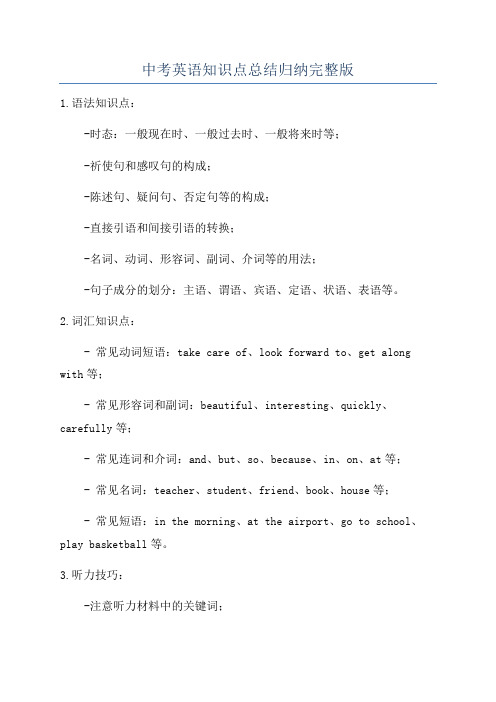
中考英语知识点总结归纳完整版1.语法知识点:-时态:一般现在时、一般过去时、一般将来时等;-祈使句和感叹句的构成;-陈述句、疑问句、否定句等的构成;-直接引语和间接引语的转换;-名词、动词、形容词、副词、介词等的用法;-句子成分的划分:主语、谓语、宾语、定语、状语、表语等。
2.词汇知识点:- 常见动词短语:take care of、look forward to、get along with等;- 常见形容词和副词:beautiful、interesting、quickly、carefully等;- 常见连词和介词:and、but、so、because、in、on、at等;- 常见名词:teacher、student、friend、book、house等;- 常见短语:in the morning、at the airport、go to school、play basketball等。
3.听力技巧:-注意听力材料中的关键词;-学会通过语境猜测单词或句子的含义;-练习听力材料,培养听力技巧;-注意听力材料中的谁在说话,对话中涉及的时间、地点、人物等信息。
4.阅读技巧:-集中注意力,全面理解文章的主旨;-注意文章的结构,抓住重点信息;-养成查字典和阅读长难句的习惯;-利用文章中的标点符号和图片等辅助理解。
5.写作技巧:-根据提纲或要求进行写作;-注意时态和语法的正确运用;-按照逻辑,合理组织文章的结构;-使用恰当的过渡词和连接词来连接句子和段落。
6.口语表达:-多进行口语练习,提高口语表达能力;-学会使用一些常用口语表达,如问候、道歉、感谢等;-注意语音语调的准确使用,避免重音和发音错误;-学会用简单明了的语言来表达自己的观点和观察。
7.语言文化:-学习英语国家的文化习俗和传统;-学习一些英语国家的历史和风景名胜;-了解英语国家的重要节日和庆祝活动;-学习英语国家的主要宗教和节日习俗。
中考英语考试涉及到的知识点比较广泛,以上总结的内容是其中的一部分。
(完整word版)初三英语知识点总结
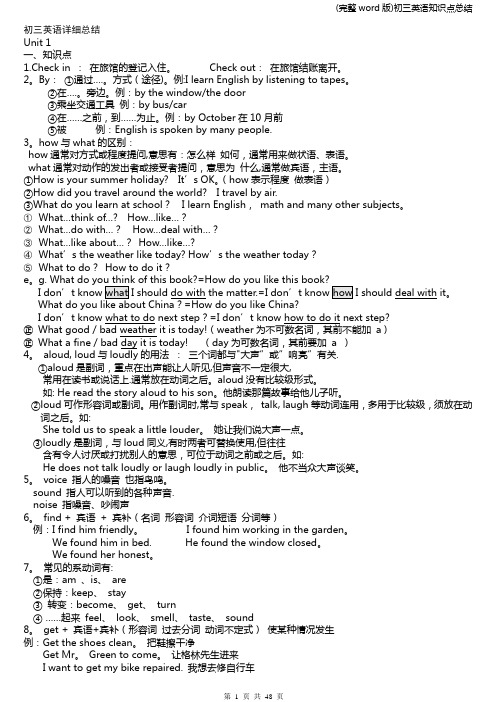
初三英语详细总结Unit 1一、知识点1.Check in :在旅馆的登记入住。
Check out:在旅馆结账离开。
2。
By:①通过….。
方式(途径)。
例:I learn English by listening to tapes。
②在….。
旁边。
例:by the window/the door③乘坐交通工具例:by bus/car④在……之前,到……为止。
例:by October在10月前⑤被例:English is spoken by many people.3。
how与what的区别:how通常对方式或程度提问,意思有:怎么样如何,通常用来做状语、表语。
what通常对动作的发出者或接受者提问,意思为什么,通常做宾语,主语。
①How is your summer holiday? It’s OK。
(how表示程度做表语)②How did you travel around the world? I travel by air.③What do you learn at school?I learn English,math and many other subjects。
①What…think of…? How…like…?②What…do with…?How…deal with…?③What…like about…?How…like…?④What’s the weather like today? How’s the weather today?⑤What to do?How to do it?e。
what I should do with how I should deal with it。
What do you like about China?=How do you like China?I don’t know what to do next step?=I don’t know how to do it next step?㊣What good / bad weather it is today!(weather为不可数名词,其前不能加a )㊣What a fine / bad day it is today! (day为可数名词,其前要加a )4。
初中中考所有的英语知识点(汇总大全)

初中中考所有的英语知识点(汇总大全)初中中考所有的英语知识点代词人称代词,物主代词,反身代词类别主格宾格形容词性物主代词名词性物主代词反身代词第一人称单数I me my mine myself复数 we us our ours ourselves第二人称单数 you you your yours yourself复数 you you your yours yourselves第三人称单数 he him his his himselfshe her her hers herselfit itits its itself复数 they them their theirs themselves1.人称代词人称代词it的特殊用法:一般it指“它”,但在表示天气、时间、距离等时,用it来代替,此时的it并不译为“它”。
当三个人称代词(单数)同时出现时,其先后顺序为you,he,I。
而复数一般采用we,you,they顺序。
2.物主代词物主代词的用法:形容词性物主代词后面一定要跟上一个名词。
名词性物主代词可作主语、表语、宾语。
3.反身代词1)反身代词的构成分两种:第一、二人称反身代词在形容词:性物主代词后加上self或selves,第三人称的反身代词在宾格代词后加上self或selves.2)反身代词的用法:一种是作宾语,由主语发出的动作又回到动作者本身。
如:I enjoyed myself at the party.另一种是作名词或代词的同位语;用来加强语气。
如:I can do it myself.初中中考所有的英语知识点梳理主要不定代词的用法:(1)one的用法A. one作为代词可以指人,也可以指物。
B. one,ones (one的复数形式) 可用来代替前面出现过的少数名词,以避免重复。
C. one的前面可用this,that,the,which等词来修饰。
D. 常有a+形容词+one这一形式。
it和one的用法区别:it用来指特定的东西,而one则用于替代不特定的东西。
中考初中英语知识点总结(大全)
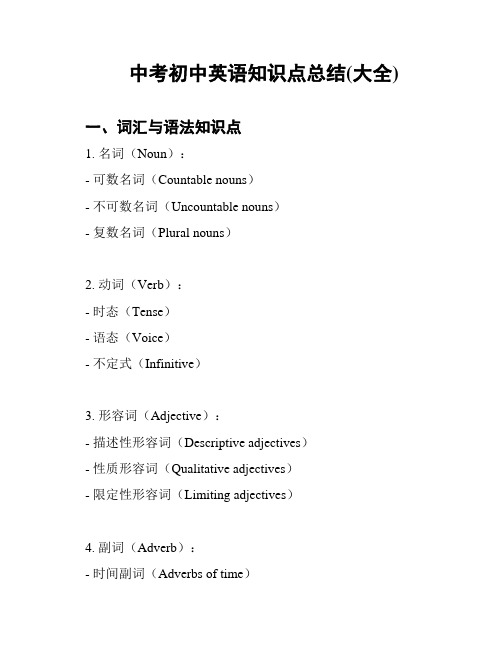
中考初中英语知识点总结(大全)一、词汇与语法知识点1. 名词(Noun):- 可数名词(Countable nouns)- 不可数名词(Uncountable nouns)- 复数名词(Plural nouns)2. 动词(Verb):- 时态(Tense)- 语态(Voice)- 不定式(Infinitive)3. 形容词(Adjective):- 描述性形容词(Descriptive adjectives)- 性质形容词(Qualitative adjectives)- 限定性形容词(Limiting adjectives)4. 副词(Adverb):- 时间副词(Adverbs of time)- 地点副词(Adverbs of place)- 方式副词(Adverbs of manner)5. 介词(Preposition):- 时间介词(Prepositions of time)- 地点介词(Prepositions of place)- 方式介词(Prepositions of manner)6. 连词(Conjunction):- 并列连词(Coordinating conjunctions)- 从属连词(Subordinating conjunctions)7. 代词(Pronoun):- 人称代词(Personal pronouns)- 物主代词(Possessive pronouns)- 反身代词(Reflexive pronouns)二、阅读理解技巧与策略1. 理解文章大意:- 主题句(Topic sentence)- 段落大意概括- 文章标题与上下文关系2. 找寻关键信息:- 关键词查找- 定位词语- 同义替换3. 推断猜测:- 从上下文推断词义- 推断作者观点- 推测故事情节4. 理解语言风格与修辞手法:- 比喻与隐喻- 夸张与反语- 概括与具体三、写作技巧与注意事项1. 作文结构:- 开头(Introduction)- 中间段落(Body paragraphs)- 结尾(Conclusion)2. 句型多样化:- 否定句与疑问句- 同位语从句- 状语从句3. 时态与语态运用:- 一般现在时(Simple present tense)- 过去进行时(Past continuous tense)- 被动语态(Passive voice)4. 单词拼写与语法错误:- 重点单词拼写- 语法错误纠正以上是中考初中英语知识点的总结,希望能对您的备考有所帮助!。
- 1、下载文档前请自行甄别文档内容的完整性,平台不提供额外的编辑、内容补充、找答案等附加服务。
- 2、"仅部分预览"的文档,不可在线预览部分如存在完整性等问题,可反馈申请退款(可完整预览的文档不适用该条件!)。
- 3、如文档侵犯您的权益,请联系客服反馈,我们会尽快为您处理(人工客服工作时间:9:00-18:30)。
1.fish在表示鱼和鱼的种类时是可数名词,在表示鱼肉时是不可数名词。
在表示鱼时单复数同形,在表示鱼的种类时复数为fishes。
故 two fish表示两条鱼,two fishes表示两种鱼。
Some fish表示一些鱼或一些鱼肉,a few fish表示一些鱼,a little fish表示一些鱼肉。
表示“糕饼”“蛋糕”等,视为物质名词,不可数;但若指一个完整的蛋糕或指切成一块块的蛋糕,则可数。
有时由于说话者的着眼点不同,以上两种用法都是可能的。
如:Please have some cake. 请吃点儿蛋糕。
There’s some cake in the kitchen. 厨房里还有些蛋糕。
I’d like a cake. A big one with lots of cream. 我想要一块蛋糕,一块带很多奶油的大蛋糕。
I like cakes.这里的cake是可数名词,(谈喜爱时)要用其复数形式。
many cakes这里的cake是可数名词,(谈品种时)要用其复数形式。
2.定冠词的用法:上文提到过一个东西,下文再次出现则需用定冠词the。
定冠词通常还会出现在一些固定搭配里面。
Open the door, please. 请开门。
Did you see the boy? 你看见那个男孩了吗?What’s the new teacher’s name? 新老师的名字叫什么?(3)指上文提到的人或事物。
例如:He lives on a farm. The farm is not big.他住在农场,这农场不大。
There are some dogs. The dogs are very lovely.这儿有一些狗。
这些狗很可爱。
3.Give sb a talk Teach sb sth考点:sb要用宾格(him,us,me),通常很容易误选所有格(my,his,our)。
4.Others=other + n 泛指,指剩余的一部分The others = the other + n 特指,指剩余的全部One … the other(用于只有两个东西的情况下,一个。
,另一个。
)Some … others(一些。
,另一些。
)Another,另一,再一,又一 another try,another cup of coffeethe other 表示范围内的另一个(范围内一共两个)we have two hands. one is on the left, the other is on the right.the others表示范围内的另一些(范围总数通常多于两个个)后面不能加名词There are 40 students in our class, three are American, the others are Chinese.another 另外的一个(有任意性)后面加可数名词单数,也可以不加名词直接使用。
I have eaten an apple, but I still want another(apple).other后既可接可数名词复数形式又可接不可数名词,如:可数,other pencils 其它的铅笔,other students 其他的学生。
不可数other tea 别的/其它的茶,other information 别的/其它消息。
others 其用法相当于复数名词,此词不能用作定语,表示的意思是“不具体的某些东西”,如: This chemical is poisonous . Others are poisonous , too . ( others = other chemicals )但是如果others前用了the ,则表示具体的别的东西。
如:I don’t want these books . Please give me the others .( the others = theother books5.Few,a few修饰可数复数名词;little,a little修饰不可数名词Few,little表示否定含义,意思为“几乎不,几乎没有”。
A few,a little表示肯定含义,意思为“一些”。
考点,通常few,little会放到反意疑问句中。
6.不同的“用”:in+语言,with+a pen/感觉器官等。
7.Be interested in doing sth/be successful in doing sth/succeed in doing sth/havesuccess in doing sth8.通常情况下,副词来修饰动词,形容词或者整个句子。
但是,以下情况需用形容词,因为“固定搭配高于一切”。
Look /taste / smell等感官动词+ adjKeep + adj/keep + n + adj9.In +一段时间,句子用的是将来时态。
10.Ask sb to do sth,考点:否定形式是ask sb not to do,而不是ask sb don’t to do。
11.Thousands of,thousand 只有在单独与of连用时才会接s。
two thousand12.人+pay+钱+ for+东西人+spend+钱/时间+on+东西(in doing sth)东西+cost +人+钱It takes+人+时间+to do sth做题技巧:首先看固定搭配,其次看是人使东西做主语。
spend的主语必须是人,常用于以下结构:(1) spend time /money on sth. 在……上花费时间(金钱)。
例:I spent two hours on this maths problem. 这道数学题花了我两个小时。
(2) spend time /money (in) doing sth. 花费时间(金钱)做某事。
例:They spent two years (in) building this bridge. 造这座桥花了他们两年时间。
(3)spend money for sth. 花钱买……。
例:His money was spent for books. 他的钱用来买书了。
cost的主语是物或某种活动,还可以表示“值”,常见用法如下:(1)sth. costs (sb.) +金钱,某物花了(某人)多少钱。
例:A new computer costs a lot of money. 买一台新电脑要花一大笔钱。
(2) (doing) sth. costs (sb.) +时间,某物(做某事)花了(某人)多少时间。
例:Remembering these new words cost him a lot of time. 他花了大量时间才记住了这些单词。
注意:cost的过去式及过去分词都是cost,并且不能用于被动句。
take后面常跟双宾语,常见用法有以下几种:(1) It takes sb. +时间+to do sth. 做某事花了某人多少时间。
例:It took them three years to build this road. 他们用了三年时间修完了这条路。
(2)doing sth. takes sb. +时间,做某事花了某人多少时间。
例:Repairing this car took him the whole afternoon. 他花了一下午修车。
pay的基本用法是:(1) pay (sb.) money for sth. 付钱(给某人)买……。
例:I have to pay them 20 pounds for this room each month. 我每个月要付20英磅的房租。
(2)pay for sth. 付……的钱。
例:I have to pay for the book lost. 我不得不赔丢失的书款。
(3)pay for sb. 替某人付钱。
例:Don?蒺t worry!I'll pay for you. 别担心,我会给你付钱的。
(4)pay sb. 付钱给某人。
例: They pay us every month.他们每月给我们报酬。
(5)pay money back 还钱。
例:May I borrow 12 yuan from you? I'll pay it back next week. 你能借给我12块钱吗?下周还你。
(6)pay off one's money还清钱。
13.It is + adj+ for sb to do sth=To do sth is adj for sb.有时候会出现改同义句的。
e的用法:Used to do:过去常常做某事(技巧:used此处是use的过去式,所以翻译为过去常常。
)Use sth to do:使用某件东西做某事Be used to do=be used for doing:被用于做某事(是上面句型的被动形式)Be used to doing:现在常常做某事15.形容词的位置:不定代词+adj:something importantAdj+enough:good enough16.表示“喜欢”的固定搭配:Like to do/like doing Would like to do Enjoy doingPrefer to do/prefer to do …than do/prefer doing …to doing…prefer 作及物动词使用,通常意思是“更喜欢,宁愿”。
1. prefer + 名词/动名词/不定式例:I prefer some apples. / I prefer having(to have) some apples. 我更喜欢吃苹果。
2. prefer somebody to do something 宁愿某人做某事例:My daddy prefers me not to swim in that river because it's too dangerous.我爸爸宁愿我不要去那条河里游泳因为那太危险了。
3. prefer A to B 在 A 和 B 中更喜欢 A例:I prefer green tea to coffee. 绿茶和咖啡比较起来我更喜欢绿茶。
I prefer cooking myself to eating out. 我宁愿自己做饭也不愿出去吃。
注意:注意这个用法中肯定的是前者,A和B必须在形式上保持一致,即要么都是名词,要么都是动名词。
没有使用不定式的用法。
4. prefer to do something rather than ...这个用法类似于用法3,不过rather than后面可以是不定式、名词、动名词或动词原形。
